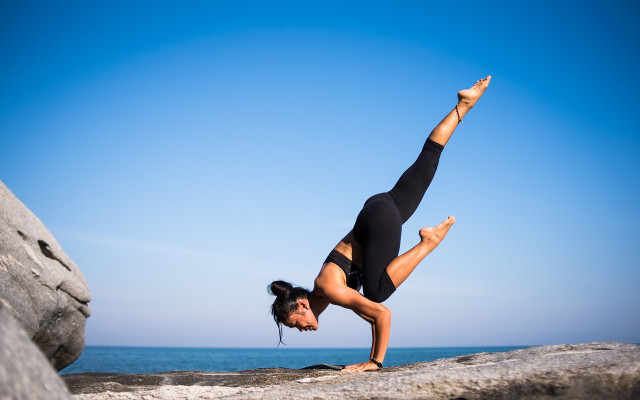
How we feel about our bodies affects how we experience the world and how we relate to ourselves and others. Therefore, a healthy body feeling is important. You can find out how to improve it here.
The name actually gives it away: Your body feeling is the feeling you have in relation to your body. It includes an awareness of how to move in your body, how parts of it feel, what they are capable of, and the needs of your body. Body awareness is important because it affects how you treat your body and how you experience the world inside it.
Body awareness develops from infancy. The interplay of physical experiences, sensations and interactions with the environment influences whether one’s own body feeling is more positive or negative. In the further course, for example, beauty standards, religious world views and the ethnic and social background shape how we feel about our bodies. But even as an adult, you can improve your body awareness and build a healthy relationship with your body.
What does a positive body image look like?
If you feel positive about your own body, you simply feel good in your body and are satisfied with it. You feel familiar, safe and comfortable dealing with and relating to your body.
A positive body feeling is the basic prerequisite for strong self-confidence, i.e. the belief in your abilities and your worth as a person – regardless of how “beautiful”, fit or young your body is according to common ideas and ideals, according to the psychologist dr Kristine Luce. You are confident in your desires for social, emotional, and physical contact, and you can derive how you are feeling and what you need from your physical sensations.
Improving body awareness: That’s why it’s important

(Photo: CC0 / Pixabay / StockSnap)
A “bad” body feeling, on the other hand, is reflected in a very critical attitude towards one’s own body. You find it difficult to accept your body as it is. Perhaps this leads you to exercise excessively, not because you enjoy it, but because you feel you don’t meet otherwise societal standards of physical beauty.
Such body dissatisfaction can make you withdraw and avoid (physical) contact to hide your insecurities. dr In this context, Luce speaks of “self-handicapping”, a strategy in which people do not take an opportunity to protect their self-esteem from the possibility of failure. For example, if a person thinks they will be discriminated against because of their body, they may not seek a promotion or avoid dating.
A negative body image can also prevent you from properly perceiving your body’s needs or even consciously ignoring them – for example, if you ignore hunger signals while you’re on a diet. According to Medical News Today, negative body awareness can also contribute to the development of mental illnesses such as depression in some cases.
This is how you can improve your body awareness
According to psychologist Dr. Luce’s body awareness is dynamic and constantly changing over the course of life. People tend to move along a continuum of their self-perception at different stages of life. Rarely is a body feeling exclusively “positive” or “negative”.
If you find that you don’t feel completely comfortable in your body and want to develop a better relationship with it, you can try to improve your body awareness. A 2021 study suggests that breaking away from ideals of beauty and learning not to value your body based on looks can help you feel more positive about your body.
Here are five tips that can help you make this happen.
1. Align your actions with your values

(Photo: CC0 / Pixabay / Pexels)
…even if it can be uncomfortable at first. This means, for example, that you go swimming because you enjoy it — even if you have negative self-esteem about your body (and therefore feel uncomfortable in swimwear).
This practice provides Dr. According to Luce, it is a “cognitive dissonance intervention.” It is based on the theory that increasing the tension (dissonance) between a person’s thoughts and actions can lead to new beliefs. In this case, you could convince yourself that feeling the sun on your skin or enjoying a bath is much more important to you than worrying about your looks.
2. Question what is shown to you as “beautiful.”

(Photo: CC0 / Pixabay / WOKANDAPIX)
If you only see flawless faces and bodies on billboards and Instagram, features of your own body that differ from those images may seem “wrong” to you. The vast majority of images shown in the media are not representative of the average body type. In addition, pictures are often heavily edited and thus reproduce a virtually unattainable ideal of beauty. Realize that there is no such thing as the “perfect” body.
There are now many accounts on Instagram that show what’s behind the photos edited with Photoshop, for example the account of journalist Danae Mercer.
3. Better body awareness: Distance yourself from ideals
A more critical understanding of ideals of beauty can also help to stop wanting to emulate them. Keep in mind that ideals of beauty are constantly changing and are not geared to people’s individual needs. After all, we all have different physical requirements and should learn to appreciate them more than all tirelessly chasing after a set ideal and neglecting our own needs.
For example, the beauty trend of “clean girls” has recently established itself. This is very problematic on different levels. It implies that flaws are “dirty” and has also been criticized for being classist, racist and “fatphobic”.
4. Learn to appreciate your body differently

(Photo: CC0 / Pixabay / moise_theodor)
You can do this, for example, by moving. According to Medical News Today, physical activity can increase confidence in one’s own strength and flexibility and contribute to mental and physical well-being. It is also said to reduce feelings of anxiety and depression.
It is important that you do not pursue the goal of changing the appearance of your body with sport or other physical activities. Instead, focus on learning and improving physical skills. For example, you might set your sights on mastering a handstand, being confident in a difficult yoga pose, or learning to juggle.
In 2015, researchers found that people who exercise for functional reasons (like fitness, flexibility, or balance) are more likely to have positive body image. Those who work out to improve their looks would have a less positive body image.
5. Choose your words carefully

(Photo: CC0 / Pixabay / StockSnap)
In informal conversations with friends or family, people often talk about their bodies or other people’s bodies in a negative way. In doing so, critical body-related comments are dropped almost casually. When people talk about how “fat” they feel or what “problem areas” they have, these are just a few small words, but they can have a big impact. They often contain a derogatory attitude towards one’s own body and are therefore a form of body shaming.
According to studies, this “fat talk” can lead to further negative feelings, a bad mood or problematic eating habits. On the other hand, compassion for one’s own body is associated with improved eating habits.
So get used to not commenting on your own body and the bodies of other people in conversations and yourself – especially not if the comments would be derogatory. Also, redirect derogatory body-related thoughts: Instead of saying your arms are “too big,” try describing them in terms of their other characteristics: Your arms are also strong, allowing you to do many things that require it doesn’t matter what they look like.
Read more on Techzle.com:
- Body positivity: 5 steps to more self-love
- Training balance: 4 exercises and tips for good body balance
- Bodyscan: This is how it works when meditating